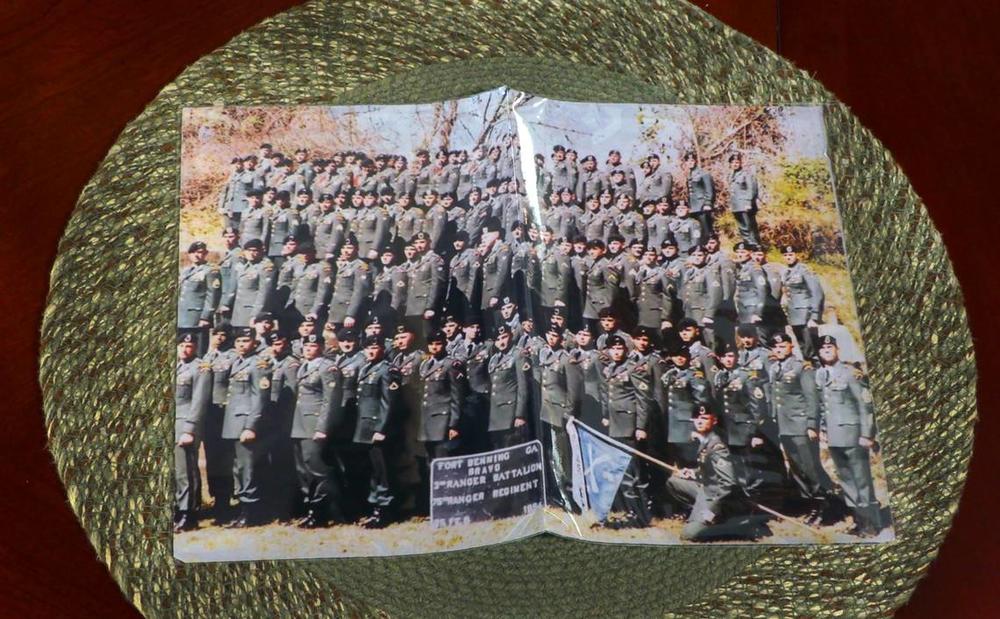
Caption
U.S. Army 1st Sgt. Glenn Harris, front row, far right, was among the soldiers who survived the 1993 Battle of Mogadishu in Somalia.
Credit: Mike Haskey / Ledger-Enquirer

U.S. Army 1st Sgt. Glenn Harris, front row, far right, was among the soldiers who survived the 1993 Battle of Mogadishu in Somalia.
Tara Harris, who grew up in Columbus, has a deeply personal connection to a documentary scheduled to debut this month on Netflix.
Surviving Black Hawk Down is a three-part series, starting Monday, that tells stories of soldiers and civilians who survived the 1993 Battle of Mogadishu in Somalia, where approximately 100 American troops held off more than 1,000 armed Somali fighters during a 15-hour engagement to rescue the survivors of three crashed helicopters.
Her father, U.S. Army 1st Sgt. Glenn Harris, was one of those soldiers. He wasn’t among the 18 Americans killed in that battle — including six fatalities in his Bravo Company unit — but, one year later, he died at the age of 35 in a parachute training accident at Fort Benning, now named Fort Moore, where his 3rd Ranger Battalion was based.
Tara, now a 41-year-old interior designer in Atlanta, was compelled to seek more information about her father 12 years ago, when her mother, Sandy Harris, the controller for the Columbus State University Foundation, was moving to a new home and gave her a bag full of memorabilia from Glenn’s military career.
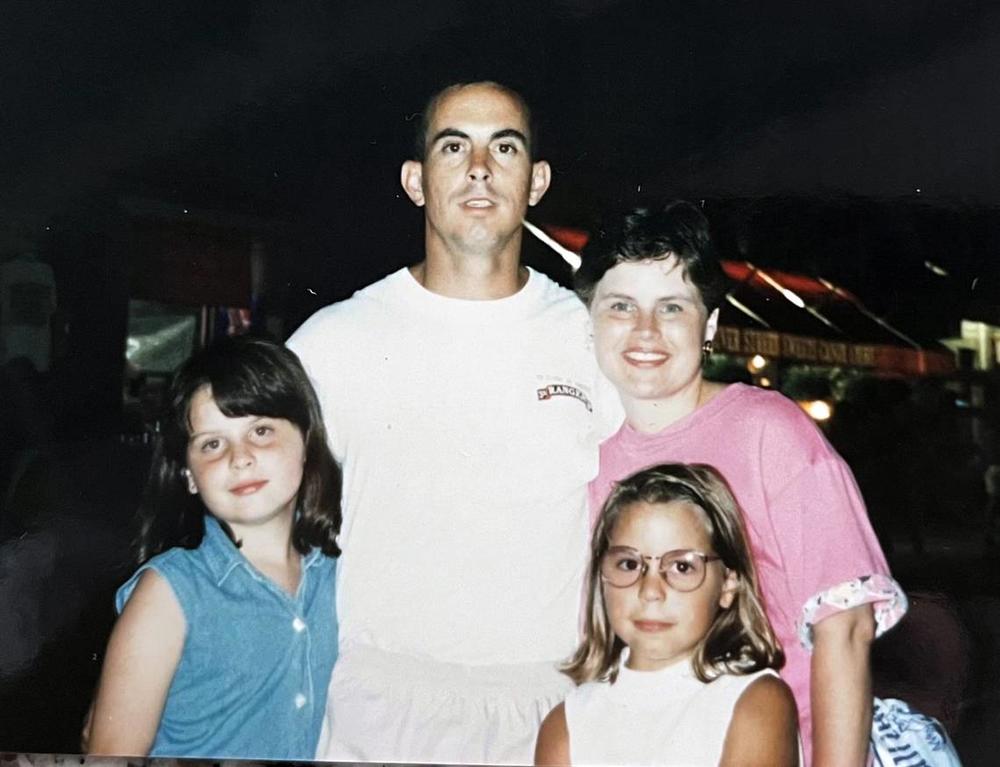
U.S. Army 1st Sgt. Glenn Harris, who was among the soldiers who survived the 1993 Battle of Mogadishu in Somalia. He is seen here with his daughters, Tara and Heather, and wife, Sandy.
“I started sifting through it,” Tara, a 2001 graduate of Hardaway High School, told the Ledger-Enquirer, “and it opened a Pandora’s box of questions.”
She committed to trying to contact and interview as many veterans from her father’s unit as she could.
“When I started reconnecting to that previous life, I just had no idea how healing reconnecting would be — not just for me but for the Rangers as well,” she said. “It’s pretty incredible.”
The Battle of Mogadishu was the subject of Mark Bowden’s 1999 bestselling book Black Hawk Down, which was adapted into Ridley Scott’s 2001 critically acclaimed movie with the same title.
But when Rangers convened in 2023 for a reunion to mark the 30th anniversary of that battle, Scott’s production team realized there was more to be told — boosted by the presentation Tara made to that gathering in Knoxville, Tennessee.
Instead of compressing the testimonials of people and events into a storyline suited for the length of a cinematic film, this docuseries features interviews with the soldiers and civilians who survived the battle.
Tara’s archival work, digitizing more than 3,000 photos and documents from her father and fellow soldiers, helped inform the documentary. It also provided a sense of closure and understanding for many of the veterans involved, she said.
The docuseries aims to provide an inside view of the events surrounding the battle, including before, during and after the conflict.
“It’s going to give a whole new perspective,” Tara said. “These guys were literally boots on the ground.”
Tara’s journey was not only about uncovering facts, but also understanding the emotional landscape of those who served with her father.
“These guys are still living with a lot of this,” she emphasized. “When they got back, it was swept under the rug.”

Tara Harris talks about her father, U.S. Army 1st Sgt. Glenn Harris, who was among the soldiers who survived the 1993 Battle of Mogadishu in Somalia. One year later, he died at the age of 35 in a parachute training accident at Fort Benning, now named Fort Moore, where his 3rd Ranger Battalion was based.
One month after the battle, on Nov. 8, 1993, Glenn spoke during a memorial service at Fort Benning. He called the fight (Operation Gothic Serpent) “one of the most fierce, most intense and most significant combat operations in recent history.”
Then he assessed his unit’s performance.
“They far exceeded my most imaginable expectations,” Glenn said during his memorial service speech. “They performed far beyond what anyone in this profession would believe to be possible.”
Tara’s dedication to preserving her father’s legacy and the stories of his fellow Rangers has been a labor of love. She noted her father’s duty to the country meant he was with his unit more than his family, so she cherishes the letters his fellow soldiers wrote to him.
“These guys are who they are today because of him,” Tara said, summarizing how they described him. “He gave them the benefit of the doubt. He actually saw something in them that they didn’t see in themselves. … He loved his Rangers. He was fiercely loyal and protective of them.”
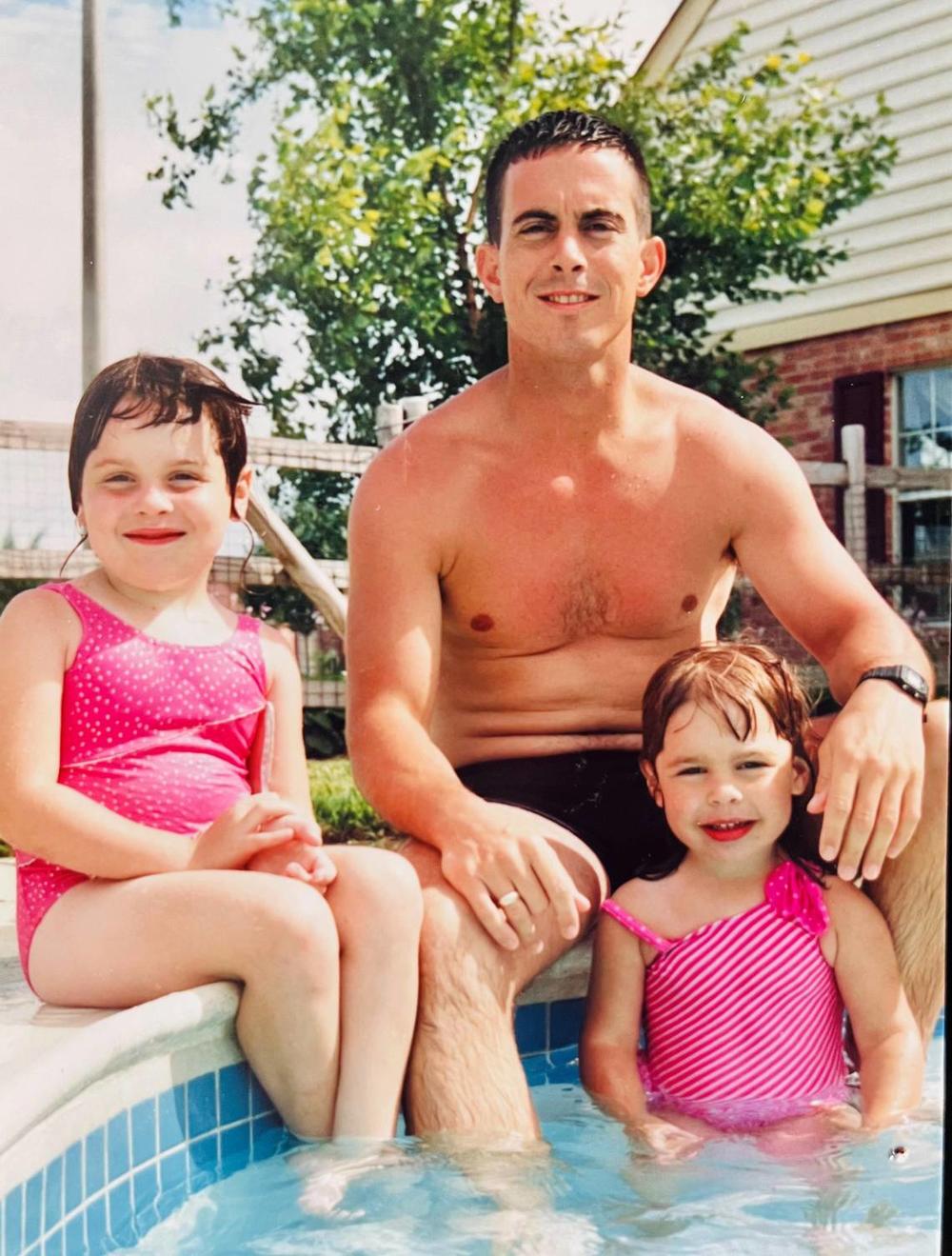
U.S. Army 1st Sgt. Glenn Harris, who was among the soldiers who survived the 1993 Battle of Mogadishu in Somalia. He is seen here with his daughters, Tara and Heather.
In return, Tara is thankful for her father’s unit.
“I will forever be grateful to the Rangers from the past and present and the Ranger community for the unwavering devotion and willingness to help my sister and I get to know who dad was,” she said. “The opportunities and projects I’ve been a part of is in part because of them — the power of being intentional.”
Glenn received a Bronze Star Medal for meritorious achievement during the Battle of Mogadishu.
“He provided security and suppressed the enemy, allowing the medics to treat a fallen comrade,” the citation says. “After the M203 gunner was wounded, he administered first-aid and then retrieved his weapon and continued to suppress the enemy until the chalk was extracted. Once the element was refitted, he took control of the forward support base, reinforced the perimeter and assisted the command in any way he could. First Sergeant Harris’s actions reflect great credit on him and the United States Army.”
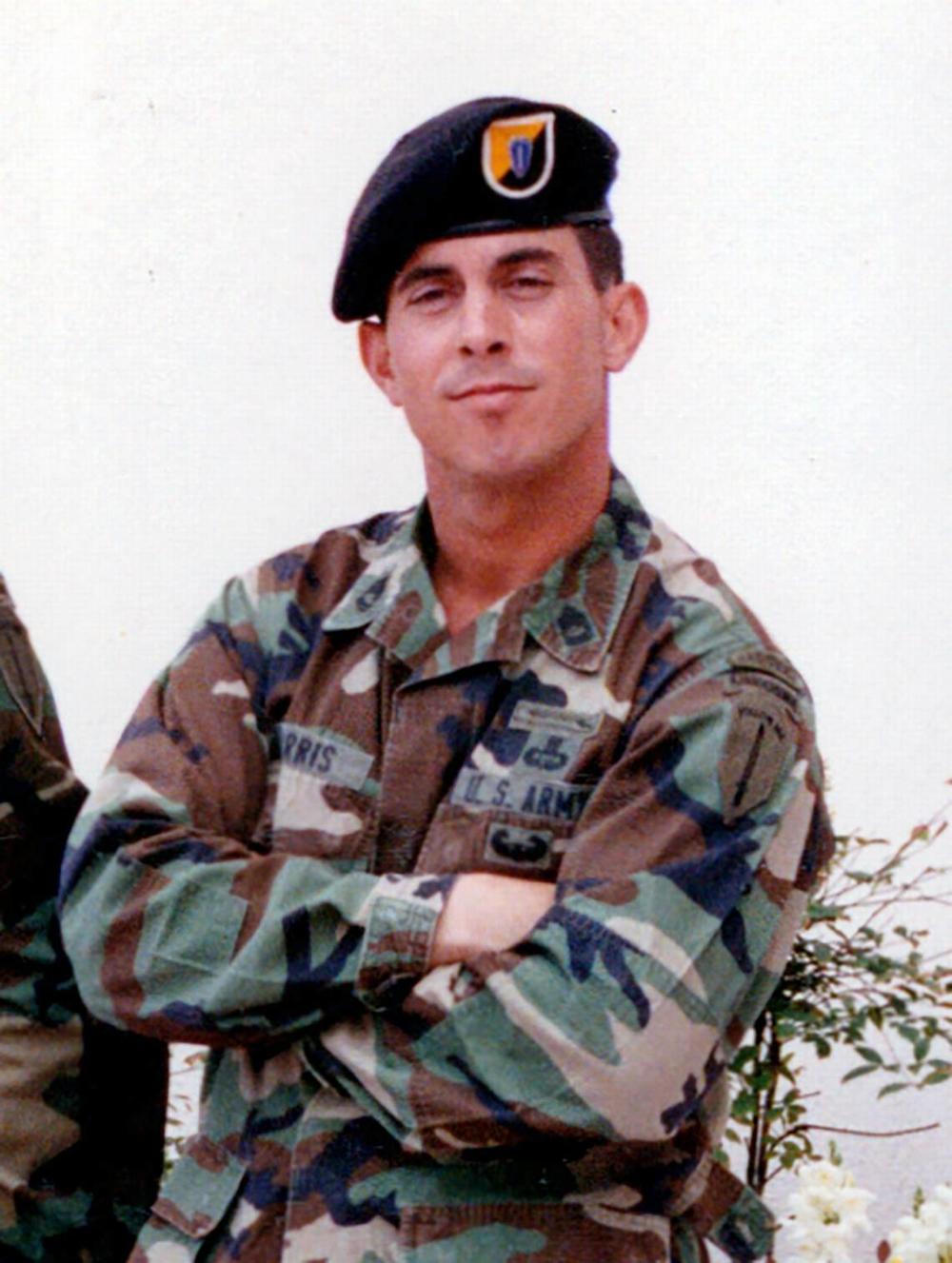
U.S. Army 1st Sgt. Glenn Harris was among the soldiers who survived the 1993 Battle of Mogadishu in Somalia. One year later, he died at the age of 35 in a parachute training accident at Fort Benning, now named Fort Moore, where his 3rd Ranger Battalion was based.
Glenn displayed another act of heroism moments before he died. The Facebook page of TSAF Industries, a Ranger equipment supplier, quoted from the Departure Airfield Control Officer’s report of the Dec. 4, 1994, training accident:
“I knew something was wrong when jumpers started exiting the bird. Glenn and several others ended up landing in the Chattahoochee River. A safety boat got to Glenn first but he demanded they attend to the other Rangers first and drown shortly thereafter. We spent the better part of the day (and evening) combing the river banks knowing that we’d see his smiling face at some point during the search, although that never happened.”
The post also quotes a fellow Ranger as saying, “This great man was taken much too soon. Of all the 1SG’s I served under, Glenn Harris was right up there at the top.”
Tara is proud of her father’s service.
“All the lessons learned in Somalia were taken seriously, resulting in immediate implementations,” she said. “By doing so, it led directly to reduced casualties and greater success in the thousands of missions conducted during the Global War on Terrorism. So the lives lost in Somalia were not lost in vain, which is a reassuring message for the Gold Star Children of that battle.”
Also during his 1993 memorial service speech, Glenn expressed the motivation behind his unit’s sacrifice for the nation.
“Freedom, it isn’t free,” he said. “It’s a priceless possession. This country’s downpayment for freedom was at Bunker Hill, Concord and Valley Forge, and throughout our 200-year history, brave men have continued to pay the price.”
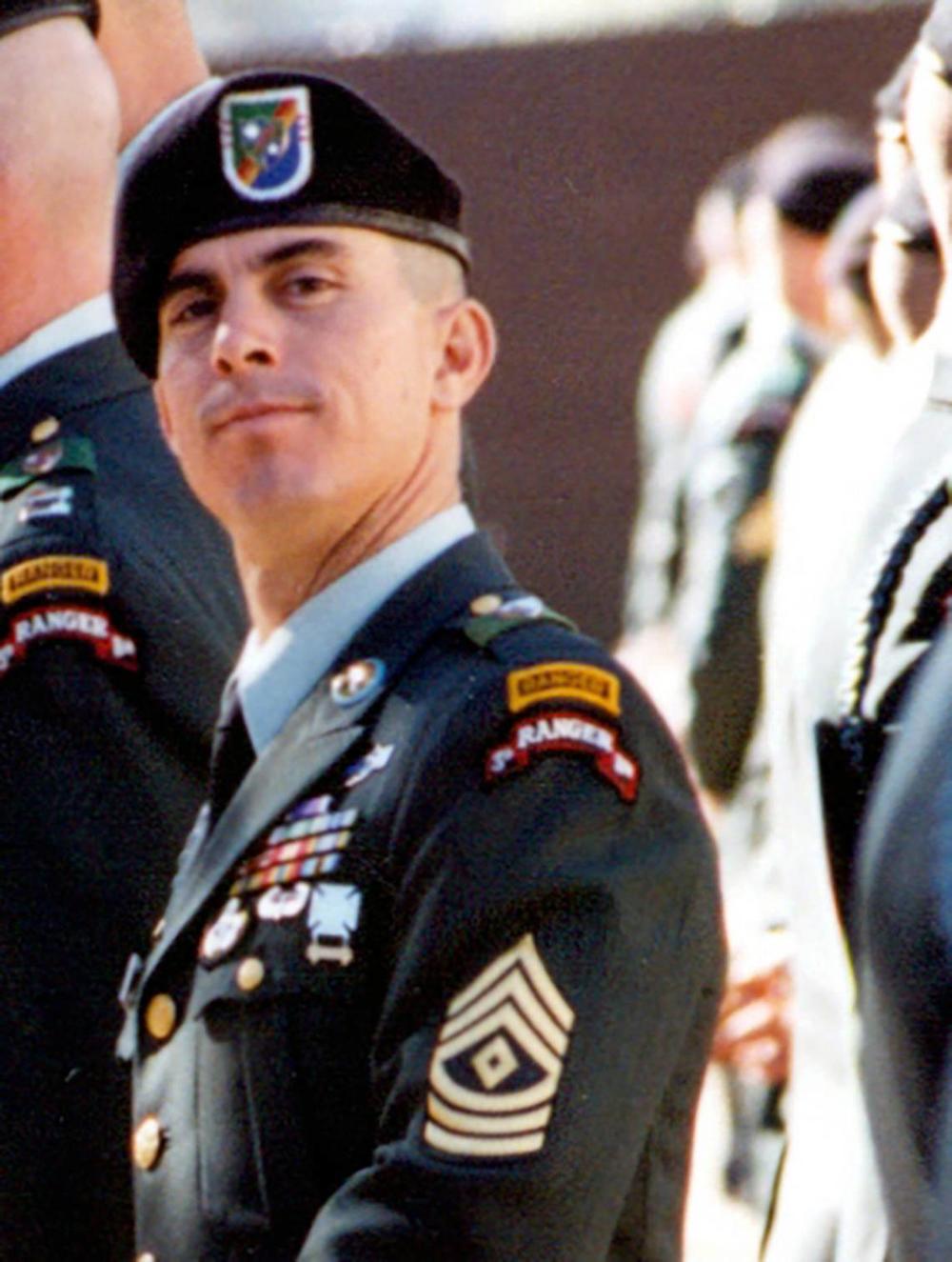
U.S. Army 1st Sgt. Glenn Harris was among the soldiers who survived the 1993 Battle of Mogadishu in Somalia. One year later, he died at the age of 35 in a parachute training accident at Fort Benning, now named Fort Moore, where his 3rd Ranger Battalion was based.
Then he explained why a unit would fight and risk the lives of others simply to fulfill the Ranger Creed to not let a fallen comrade fall into the hands of the enemy.
Glenn quoted theologian Leslie Weatherhead’s story of a dying soldier during World War II saying his attempt to bring a wounded buddy back to safety was “worth it … because when I got to him, he said, ‘Jim, I knew you would come.’”
The first sergeant also quoted philosopher John Stuart Mill: “War is an ugly thing, but not the ugliest of things. The decayed and degraded state of moral and patriotic feeling which thinks that nothing is worth war is much worse. The person who has nothing for which he is willing to fight, nothing which is more important than his own personal safety, is a miserable creature and has no chance of being free unless made and kept so by the exertions of better men than himself.”
Glenn concluded with his own words: “I am tremendously honored to have had the opportunity to rub shoulders with such courageous men, these heroes. I love them and will always remember them.”
This story comes to GPB through a reporting partnership with Columbus Ledger-Enquirer.